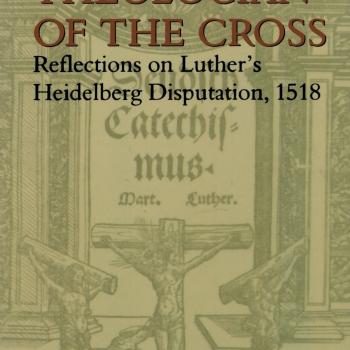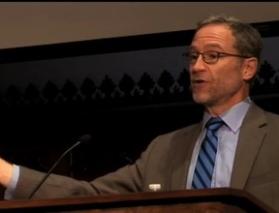
+++
“Truly, you cannot read Scripture too much; and what you read, you cannot understand too well; and what you understand, you cannot teach too well; and what you can teach, you cannot live too well.”
–Martin Luther
+++
Getting ready to make some New Year’s resolutions for this year? Below are some thoughts to help you prioritize — thinking about the matter of growing in faith and abounding in good works… (see, e.g. 2 Cor. 9:8)
A few months ago here, I asked the question of whether an atheist could do any truly good works. So first, to get started, let’s briefly address some of my Lutheran brethren who question whether or not they can!
First, a couple tweets from a “Radical Lutheran” to chew on:
One of the greatest accomplishments (for a while, anyway) of the Reformation is that finally we could have total assurance of being one of the elect..WITHOUT the need to look inward. Apart from anything that we do, say, feel, or think.
— Steve Martin (shaking the ladder) (@pudicat11) August 11, 2018
There is a lot of truth in this… this goes hand in hand with the importance of the doctrine of justification… how we are saved by grace alone though faith alone in Jesus Christ. Now though, note Mr. Martin’s last few sentences here:
I’m saying the ideal is to live and love God..and neighbor as much as we love ourselves. And that we are self lovers first and foremost is the reason that we don’t. That we won’t.
So..Jesus admonishes is to “die to self”. We still refuse. He knows we won’t. So He Baptizes us.— Steve Martin (shaking the ladder) (@pudicat11) August 12, 2018
Again, one can make a case that this is certainly true about our justification. Dead in our sin, faith cannot come without God giving us the same (and baptism comes with faith, not before it)! At the same time, Radical Lutherans also carry this same attitude — “He knows we won’t” — into the realm of sanctification, or our spiritual growth.
The problem with this view (which it seems is much like that of the late novelist John Updike) is that even as “He knows we won’t,” He knows we will as well.

After all, it is not only fallen man who must depend on God for all things. In truth, we were created to depend on God, the weaker one drawing strength from the Stronger One…

Furthermore, given that the Apostle Paul in Ephesians 1 asserts that:
“[God is,] in all wisdom and insight making known to us the mystery of his will, according to his purpose, which he set forth in Christ as a plan for the fullness of time, to unite all things in him, things in heaven and things on earth.
In him we have obtained an inheritance, having been predestined according to the purpose of him who works all things according to the counsel of his will…”
We should recognize that God working for the “good” in all things (covered here more in a recent post), spoken of in Romans 8:28 as well, means working towards the purposes Paul mentions here.

And given that:
“….we also thank God constantly for this, that when you received the word of God, which you heard from us, you accepted it not as the word of men but as what it really is, the word of God, which is at work in you believers” (I Thes. 2:13)
And that
“But he said to me, ‘My grace is sufficient for you, for my power is made perfect in weakness.’ Therefore I will boast all the more gladly of my weaknesses, so that the power of Christ may rest upon me” (2 Cor. 12:9)
And finally:
“For by grace you have been saved through faith. And this is not your own doing; it is the gift of God, not a result of works, so that no one may boast. For we are his workmanship, created in Christ Jesus for good works, which God prepared beforehand, that we should walk in them” (Ephesians 2:8-10)
We believers must never assert that God does not give us sufficient love and strength to do the works He calls us to and to do!

Surely, as noted above, with the initial conversion of the Christian, also known as regeneration, our faith may be said to be passive, as God’s Holy Spirit grants both repentance and faith by hearing. Think about the child at his mother’s breast! (more here on this kind of infant-like faith). As Luther rightly confessed:
“I believe that I cannot by my own reason or strength believe in Jesus Christ, my Lord, or come to Him; but the Holy Spirit has called me by the Gospel, enlightened me with His gifts, sanctified and kept me in the true faith.”

On you was I cast from my birth,
and from my mother’s womb you have been my God.”
In like fashion, one may reasonably conclude that because of
- the presence of God’s Holy Spirit in us,
- the measure of the knowledge of God and His ways that we have been given, and
- the measure of grace God has given us and continues to gives us in this or that particular circumstance
…we Christians cannot but depend on God, even unconsciously, and hence often succeed in enacting the good works that He has planned for us (like Luther put it so marvelously here).
That said, we should not imagine that en route to serving our neighbor for His Name’s sake (why we are here!), there will also not be other times when–particularly in the midst of trial and temptation–it may be necessary for us, empowered by His Holy Spirit, to consciously look to Him for more, depend on Him for more: rely on the truth and promises He has planted in our heart, cry out to Him, ask Him to fill us with His Holy Spirit, show us better paths to walk on, include fasting on our paths, etc.

Furthermore, given that the Apostle in 1 Cor. 7 says that
“If anyone is worried that he might not be acting honorably toward the virgin he is engaged to, and if his passions are too strong and he feels he ought to marry, he should do as he wants. He is not sinning. They should get married. But the man who has settled the matter in his own mind, who is under no compulsion but has control over his own will, and who has made up his mind not to marry the virgin—this man also does the right thing. So then, he who marries the virgin does right, but he who does not marry her does better” (I Cor. 7:36-38)
We should be aware that not rejecting God’s grace in this or that circumstance, sufficient for us, will result in us being able to determine not only what is right but what is the even better thing — or at least will get us on the road to such recognition!
Some might insist: all of this is abandoning Lutheranism!
It’s not. And even if it was abandoning “Lutheranism,” today, it would not be abandoning Martin Luther nor those who followed faithfully in his train.

In the Antinomian Disputations of the late 1530s, Luther responded to the following proposition: “We are not obliged to do the impossible. The law is impossible. Therefore we are not obliged to do it,” as follows:
It is said improperly, that is, not rightly and not fittingly, that we are obliged to do what is impossible by the law. When Adam was first created, the law was for him not only something possible, but even something enjoyable. He rendered the obedience the law required with all his will and with gladness of heart, and did so perfectly. Yet what now, after the fall, is impossible, is so not by fault of the law, but by our fault. It is not the fault of the one binding, but of the one sinning, hence this statement, The law urges us to do what is impossible, needs to be understood fittingly, for if you want to preserve the strict sense of the words, it sounds as if God himself is being accused of burdening us with the impossible law. Yet it is sin and Satan, who made the possible and enjoyable law impossible and terrifying, who are to be accused.
Christ, however, by willingly submitting himself to the law and enduring all its curses, earned for those who believe in him the Spirit, being driven by whom they also in this life begin to fulfill the law; and in the life to come the most joyful and perfect obedience will be within them, so that they will do in body and soul as now do the angels (SDEA 47, 49).
Again, as I noted above, “we believers must never assert that God does not give us sufficient love and strength to do the works He calls us to and to do.” We do not say this for Adam and Eve in the Garden of Eden, and we do not say this about ourselves now – even if every good work that we do here will be tainted by sin and sinful motivation, to this or that degree.
Ultimately, why does this not need to condemn us? I mean, given that God’s law requires perfection, there is no doubt we should be condemned!

It is because we are yoked with Christ, who lived the life we could not, and died the death we deserved to die. With Him, “it is finished” indeed, and God sees all of our good works though His good work. We are robed in His righteousness.
Because this loving Savior’s yoke is easy and His burden is light, we gladly strive in Him.
We ultimately do so – and now, post-fall must even remind ourselves that we do so (we are always now tempted to believe that our good works save us!) – from the peace that we have with God through the forgiveness, life, and salvation Christ brings–and continues to bring us, in His perpetual pardon and power every day!*
We are, again, “in the groove,” as Concordia Seminary St. Louis professor Joel Beirmann puts it. Christ returns us to that child-like peace and innocence and creaturely limitedness (a good weakness!) that we had in the garden with our Creator!

FIN
Images: Sin target: http://www.flickr.com/photos/ccfp/3234368992 ; Yoke: https://en.wikipedia.org/wiki/Yoke
* As my pastor put it years ago, we are “MacGyver Christians”: everything we need we already have…












